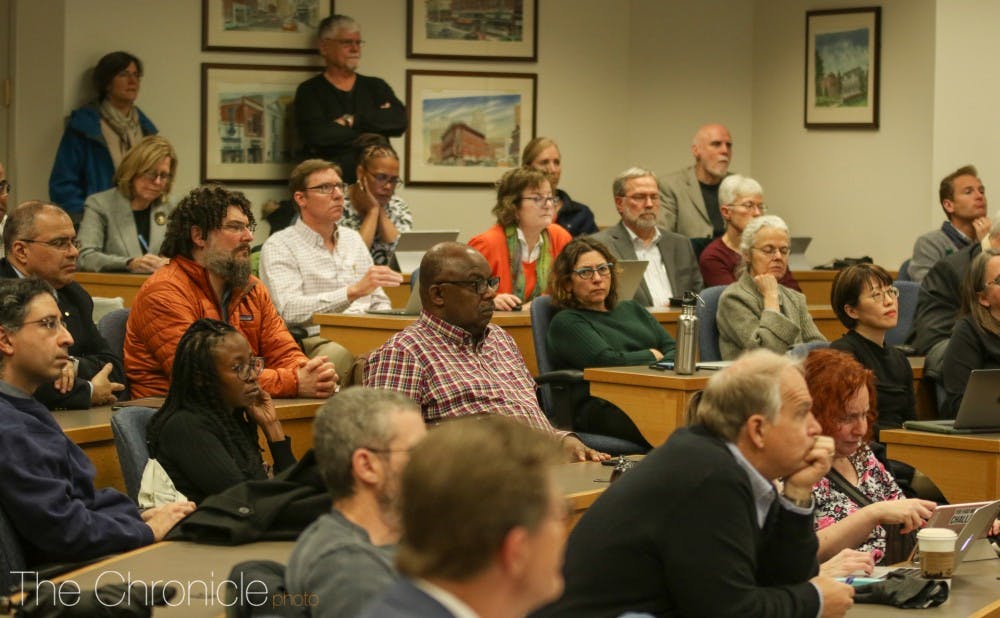At Thursday’s meeting, the Academic Council discussed proposed revisions to the University's research misconduct policy and Duke's response to the biostatistics department incident.
Geeta Swamy, vice dean and associate vice provost for scientific integrity, presented these changes to the 2007 policy, which is found in Appendix P of the Faculty Handbook. She said that Duke’s current policy needed clarification because there are several practices that unnecessarily go beyond regulatory requirements.
Academic Council also elected Kerry Haynie, associate professor of political science, to be its next chair.
Swamy explained the reasoning behind some of the proposed policy changes.
“For example, in the federal regulations, the statute of limitations is six years, and our policy has been silent on that, which means when there’s an allegation, there’s no time frame," she said. "And while that may be the interest of someone bringing forth an allegation, what that does is actually clog up the system and produce a lot of inefficiency in dealing with all of the cases that come forth.”
Furthermore, Swamy added that the revised policy focuses on removing discrepancies between how the process is outlined and how it is actually implemented, as well as conforming to the Office of Research Integrity’s recommended template for responding to allegations of research misconduct.
“Having some sort of standardized template [among universities and institutions] can help bring forth more clarification,” Swamy said.
The new policy narrows the definition of research misconduct to its regulatory definition—which is the fabrication, falsification and plagiarism in proposing, performing, reviewing research or reporting research results.
This change would remove other types of misconduct, such as harassment in academia from the definition. Swamy said that other types of misconduct would still be addressed through a separate process from that of research misconduct.
She explained that the separation would allow other types of misconduct to be part of the broader context rather than be limited to just research conduct.
The revised policy would also broaden its scope to include all researchers instead of just faculty. Cases involving students and staff who are not federally funded, however, may not go through the same review process and may be referred to the applicable school or college at the discretion of a deciding official.
In addition, the policy would allow for deans of schools to determine the need for administrative leave and salary continuation throughout the investigation process. Consistent with federal regulations, the policy also adds a six-year statute of limitations for the review of allegations.
After the presentation, the council went into a private executive session to consider updates on the biostatistics email situation and to continue its discussion from previous meetings about faculty conduct and general steps needed to improve Duke’s faculty climate.
Academic Council Chair Don Taylor said that the calling of the executive session was necessary because the incident is still being actively investigated by the Office of Institutional Equity. During the session, the council emphasized its commitment to ensuring the students involved in the biostatistics incident are protected and acknowledged the concerns and feelings within Duke’s international community.
In their ongoing discussion about ways to address faculty conduct and professionalism, Abbas Benmamoun—vice provost for faculty advancement—and Claudia Gunsch—associate vice provost for faculty advancement—stressed the need for faculty to take greater cultural responsibility within the Duke community.
“In response to President [Vincent] Price’s call for action following Duke’s self-assessment on harassment in November 2018, [we] started meeting with unit leaders to review their results and discuss local efforts for improving overall campus climate," Gunsch wrote in an email to The Chronicle after the session. "These meetings are the first step in developing policies, programs and practices to strengthen Duke’s efforts to ensure an inclusive and respectful environment where faculty, students, and staff can thrive and excel.”
According to these 2018 self-assessment scores, approximately 17 percent of the Duke community reported to have experienced discrimination or harassment in the last five years.
“A broader conversation is taking place to establish the responsibilities that should accompany the privilege of being a Duke faculty member,” Gunsch wrote. “Several national organizations including the National Academy of Sciences have established codes of conduct for their members and many Duke faculty have expressed the need for such a standard.”
Additionally, she noted that the Office for Faculty Advancement has developed a series of workshops for unit leaders and faculty to raise awareness and provide best practices for addressing some of the cultural challenges facing the community.
“Faculty play a critical role in defining Duke’s climate and faculty should be leading the cultural change on our campus,” Gunsch wrote.
Get The Chronicle straight to your inbox
Signup for our weekly newsletter. Cancel at any time.

Mona Tong is a Trinity senior and director of diversity, equity and inclusion analytics for The Chronicle's 117th volume. She was previously news editor for Volume 116.

